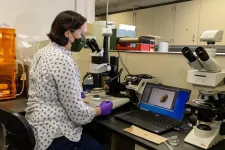(Press-News.org) AMHERST, Mass. – The global demand for palm oil—the most widely consumed vegetable oil on the planet, in everything from instant noodles to lipstick—is driving worldwide tropical deforestation. While many studies have shown the loss of biodiversity when rainforests are converted to oil palm plantations, researchers at the University of Massachusetts of Amherst are the first to show far-reaching and wide-ranging disturbances to the watersheds in which such plantations occur. Because many Indigenous peoples rely on water downstream from the plantations for their daily needs, the marked decrease in water quality has the potential to exacerbate public health issues in Indigenous communities. The study was published recently in Science of the Total Environment.
To conduct their research, lead author Briantama Asmara, who completed this work as part of his graduate studies at UMass Amherst, and senior author Timothy Randhir, professor of environmental conservation at UMass Amherst, focused on the Kais River watershed of West Papua, the western half of New Guinea’s island, an area of more than 1,000 square miles. Approximately one-quarter of the watershed has been turned into oil palm plantations. The watershed is also one of the oldest continually inhabited homes for different groups of Indigenous Papuans.
“The Kais River watershed, like many of the places where oil palm plantations are situated, is very remote and not particularly well studied,” says Randhir.
Asmara adds that, “though the palm oil companies have lots of data about what pesticides they’re using, the timing of their irrigation efforts, issues with runoff, etc., that information isn’t making it out to the downstream communities. I conducted this research because I wanted to get better, publicly available data to the people whose lives are being most affected.”
Asmara and Randhir relied on a powerful improved version of a watershed model known as the Soil and Water Assessment Tool (SWAT+) that assesses how a region’s hydrology responds to different land-use scenarios. They then fed the model data on the Kais watershed’s land cover, soils, elevations, stream networks and climate data. The team modeled three different scenarios: the historical baseline, using land-cover data from 2010–15; an altered scenario, representing the contemporary landscape with its large oil-palm plantations as of 2015–21; and a future scenario, forecast from 2024 out to 2034, that assumed a steady rate of plantation expansion and which also included the next 10 years’ worth of changing climate data.
Their findings show that the transition from tropical rainforest to contemporary oil-palm plantation has increased precipitation, runoff and soil moisture. Water quality has gotten dramatically worse since the plantations began: sedimentation has increased by 16.9%, nitrogen by 78.1% and phosphorous by 144%.
Though the worst effects on water quality will moderate somewhat according to the team’s future scenarios—the total tonnage of phosphorous carried by the watershed will decrease from 2,418 tons to 2,233.7—the water quality will remain far worse, and there will be more runoff than before the rain forest was converted to oil-palm plantation.
“The downstream Indigenous people who rely on the rivers and the streams in the watershed are highly vulnerable,” says Randhir. “They are bearing all the environmental and public health costs, while the international palm oil companies are reaping the rewards.”
“And yet,” says Asmara, “our research can help. Now that we know what the oil-palm plantations are doing to the watershed, both the industry and local governments can take action.” Asmara and Randhir suggest that regulators work to limit the use of pesticides, especially during periods of flooding, conduct continuous water quality monitoring, maintain riparian buffers and, most importantly, ensure that downstream communities have access to up-to-date water quality information.
Contacts: Timothy Randhir, randhir@umass.edu
Daegan Miller, drmiller@umass.edu
END
Oil palm plantations are driving massive downstream impact to watershed
Researchers at UMass Amherst find Indigenous populations bear the environmental and public health costs when native Indonesian forests are converted to oil palm plantations
2024-05-02
ELSE PRESS RELEASES FROM THIS DATE:
Nanotubes, nanoparticles, and antibodies detect tiny amounts of fentanyl
2024-05-02
A research team at Pitt led by Alexander Star, a chemistry professor in the Kenneth P. Dietrich School of Arts and Sciences, has developed a fentanyl sensor that is six orders of magnitude more sensitive than any electrochemical sensor for the drug reported in the past five years. The portable sensor can also tell the difference between fentanyl and other opioids.
Their work was published in the journal Small.
Fentanyl is a synthetic opioid and one of the main drivers in overdose deaths in the United States, Star said. It’s often mixed with other drugs, but because ...
New eco-friendly lubricant additives protect turbine equipment, waterways
2024-05-02
Scientists at the Department of Energy’s Oak Ridge National Laboratory have developed lubricant additives that protect both water turbine equipment and the surrounding environment.
Each year, roughly 2.47 billion gallons of lubricating oil are consumed in the United States alone for engines and industrial machinery, according to DOE, with about half eventually finding its way into the environment.
While environmentally acceptable lubricants are available, they are not optimized with additives that can greatly improve performance while posing minimal environmental impact if accidentally released. To create nontoxic, biodegradable and high-performing lubricant ...
Monoclonal Antibodies in Immunodiagnosis and Immunotherapy appoints new Deputy Editor-in-Chief, Andrei Moroz, PhD
2024-05-02
Mary Ann Liebert, Inc., is pleased that Andrei Moroz, PhD, has been appointed the new Deputy Editor-in-Chief of the bimonthly journal Monoclonal Antibodies in Immunodiagnosis and Immunotherapy. Dr. Moroz is joining Cory Brooks, PhD, as part of the senior editorial leadership team for the journal.
Monoclonal Antibodies in Immunodiagnosis and Immunotherapy is a peer-reviewed venue for promoting and sharing research rooted in hybridoma technology. It aims at advancing the understanding of the biology and immunology that underscores the utility of antibodies as diagnostics and therapeutics. The journal publishes ...
Optical pumped magnetometer magnetocardiography as a potential method of therapy monitoring in fulminant myocarditis
2024-05-02
https://www.scienceopen.com/hosted-document?doi=10.15212/CVIA.2024.0031
Announcing a new article publication for Cardiovascular Innovations and Applications journal. Fulminant myocarditis (FM) is associated with high mortality and an unfavorable long-term prognosis. However, noninvasive, rapid diagnostic and monitoring methods for FM are lacking.
This article details the case of a patient diagnosed with FM through a comprehensive assessment involving typical clinical symptoms, laboratory analyses, echocardiographic evidence, and cardiac magnetic resonance (CMR) findings. Before the patient underwent CMR, optical pumped magnetometer magnetocardiography (OPM-MCG) revealed abnormalities characteristic ...
Heart failure registries in Asia – what have we learned?
2024-05-02
https://www.scienceopen.com/hosted-document?doi=10.15212/CVIA.2024.0026
Announcing a new article publication for Cardiovascular Innovations and Applications journal. Heart Failure (HF) is one of the leading problems in cardiology practice today. Acute decompensated heart failure (ADHF) is a significant cause of mortality and morbidity worldwide, and this is more relevant in the Asian subcontinent with a high population burden. Various regional registries in Asia have given us valuable insight into the aetiology and outcomes in this context. Though there are regional differences, it is clear from the review carried out in this paper that HF affects a much younger population. ...
Study helps understand how energy metabolism is regulated at cellular level
2024-05-02
An article published in The Faseb Journal describes a Brazilian study analyzing the correlation between two key energy metabolism regulation processes: the absorption and release of calcium ions by mitochondria, the organelles that generate energy for cells; and autophagy induced by calorie restriction. Autophagy occurs when cells break down and reuse their own cytoplasm.
The study was conducted at the Center for Research on Redox Processes in Biomedicine (Redoxome), a Research, Innovation and Dissemination Center (RIDC) funded by FAPESP and hosted by the University of São Paulo’s Institute of Chemistry ...
Stay active – or get active – to boost quality of life while aging, study suggests to middle-aged women
2024-05-02
Consistent adherence to physical activity guidelines throughout middle-age is associated with a higher health-related quality of life in women, according to a new study publishing May 2nd in the open-access journal PLOS Medicine by Binh Nguyen of University of Sydney, Australia, and colleagues.
The evidence for an association between physical activity and health-related quality of life has been based primarily on cross-sectional studies and short-term randomized controlled trials. Few longitudinal studies have measured physical activity at more than one time point and examined the long-term causal effects ...
*FREE* Friendship-nomination approach identifies key villagers to diffuse health messages
2024-05-02
In experiments in isolated villages in Honduras, researchers evaluated a new strategy for identifying individuals that could be targeted for effective information spreading. Their approach – more effective than random targeting, and also less time-requisite than approaches that require a complete understanding of the relevant social network – could have far-reaching policy implications in lower and middle-income countries. Understanding the structure and function of human social networks has yielded insights for exploiting social ...
Chromosomal 22q11.2 deletion confers risk for severe spina bifida
2024-05-02
Chromosomal 22q11.2 deletions increase risk for meningomyelocele, one of the most severe and common forms of spina bifida, researchers report. According to the findings, this risk is mediated by the loss of Crkl, one of several neural tube expressed genes located on the 22q11.2 deletion interval, and this risk is only partially alleviated by folate supplementation. Meningomyelocele (MM) is a severe type of neural tube defect, which often requires pre- or post-natal surgical repair and can result in a variety of physical and developmental difficulties. Although the incidence of the condition has declined in recent decades, largely due to folic acid (FA) fortification, MM ...
Circadian clocks in the brain and muscles coordinate to support daily muscle function
2024-05-02
Molecular circadian clocks in the brain and muscle tissue cooperate to keep muscles healthy and functioning daily, according to a new study in mice. The findings could provide valuable insight into understanding the roles of circadian disruption in age-associated health issues and potential strategies to protect muscle function in aging individuals. A circadian molecular clock network is crucial for daily physiology and maintaining health. It’s thought that this network – which extends throughout all cells in the body – is hierarchically organized and coordinated by the brain’s suprachiasmatic nucleus (SCN), which receives daily light cues and synchronizes ...
LAST 30 PRESS RELEASES:
ASU researchers to lead AAAS panel on water insecurity in the United States
ASU professor Anne Stone to present at AAAS Conference in Phoenix on ancient origins of modern disease
Proposals for exploring viruses and skin as the next experimental quantum frontiers share US$30,000 science award
ASU researchers showcase scalable tech solutions for older adults living alone with cognitive decline at AAAS 2026
Scientists identify smooth regional trends in fruit fly survival strategies
Antipathy toward snakes? Your parents likely talked you into that at an early age
Sylvester Cancer Tip Sheet for Feb. 2026
Online exposure to medical misinformation concentrated among older adults
Telehealth improves access to genetic services for adult survivors of childhood cancers
Outdated mortality benchmarks risk missing early signs of famine and delay recognizing mass starvation
Newly discovered bacterium converts carbon dioxide into chemicals using electricity
Flipping and reversing mini-proteins could improve disease treatment
Scientists reveal major hidden source of atmospheric nitrogen pollution in fragile lake basin
Biochar emerges as a powerful tool for soil carbon neutrality and climate mitigation
Tiny cell messengers show big promise for safer protein and gene delivery
AMS releases statement regarding the decision to rescind EPA’s 2009 Endangerment Finding
Parents’ alcohol and drug use influences their children’s consumption, research shows
Modular assembly of chiral nitrogen-bridged rings achieved by palladium-catalyzed diastereoselective and enantioselective cascade cyclization reactions
Promoting civic engagement
AMS Science Preview: Hurricane slowdown, school snow days
Deforestation in the Amazon raises the surface temperature by 3 °C during the dry season
Model more accurately maps the impact of frost on corn crops
How did humans develop sharp vision? Lab-grown retinas show likely answer
Sour grapes? Taste, experience of sour foods depends on individual consumer
At AAAS, professor Krystal Tsosie argues the future of science must be Indigenous-led
From the lab to the living room: Decoding Parkinson’s patients movements in the real world
Research advances in porous materials, as highlighted in the 2025 Nobel Prize in Chemistry
Sally C. Morton, executive vice president of ASU Knowledge Enterprise, presents a bold and practical framework for moving research from discovery to real-world impact
Biochemical parameters in patients with diabetic nephropathy versus individuals with diabetes alone, non-diabetic nephropathy, and healthy controls
Muscular strength and mortality in women ages 63 to 99
[Press-News.org] Oil palm plantations are driving massive downstream impact to watershedResearchers at UMass Amherst find Indigenous populations bear the environmental and public health costs when native Indonesian forests are converted to oil palm plantations






